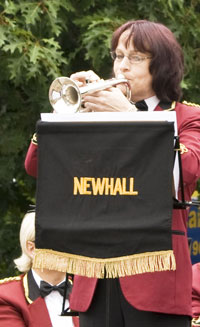cornet-mouthpiece.info
Performance anxiety
Beat the nerves when playing music
Introduction

You walk out onto the stage. Your mouth goes dry, your heart starts beating hard and fast. Your knees shake. Your concentration fails and you become damp with sweat.
Does this sound familiar? Performance anxiety is self-fulfilling and self-perpetuating. Some say that nerves are essential to a good performance, but the physical effects of the nervousness can be detrimental to good playing. What should be an enjoyable shared experience for player and audience turns into an ordeal.
I don't have any qualifications in psychology, but I have experienced the symptoms above. And I have beaten it. I can now stand in front of several hundred people and put on a performance I'm proud of.
The secret
My 'road to Damascus' moment was realising that my solution didn't lie in building confidence, but reducing self-consciousness. The two are often confused but they are different things. self-consciousness means giving too much attention to what others are thinking of you. You're worried about their disapproval. This preoccupation is a distraction and causes the palpitations and other physical effects.
A strategy
- Reduce self-consciousness. Stop caring what others think of you.
- Find techniques which help you to overcome those physical symptoms and learn to play well even when you are nervous.
- Break the Pavlovian fear response to the situation you have learned.
More detail - 1. Reduce self-consciousness
"Get over it and move on. It ain't all about you."
Simple affirmations like "What's the worst that can happen?" and "I really don't care what anyone thinks about me" will immediately change the way you carry yourself.
Of course you do have to care what people think. Someone who genuinely doesn't care is a psychopath and I'm not recommending that. We wouldn't bother to perform at all if the shared experience meant nothing.
However, suffering from performance anxiety is a sign that we are over-concerned with what others think. Therefore, to reduce the anxiety, we have to let go of that preoccupation. It's liberating to pretend to yourself for a little while that you don't care.
More detail - 2. Find techniques which help to overcome those physical symptoms
There are many techniques in books and online which may help you develop confidence or overcome anxiety, physical and mental. Not all will work for you, but try as many as you can and see what does work.
The Alexander technique is a real life-changer. There are people who are trained in teaching it to you but much can be gained from books and the web.
Deep or regular breathing is a suggestion that appears again and again. Google 4-7-8 and vacuuming the lungs
Develop the ability to consciously raise your soft palate. When I'm very relaxed my airway is open and I can play. When I'm tense, I find that my soft palate constricts the air and reduces the ability to play, particularly high notes.
I also find that my neck muscles tense. Relaxing my shoulders and keeping my head up and straight produces much better playing. This all ties in with the Alexander technique principles of overcoming subconscious reactions that you have developed.
Many of the techniques suggested in books and articles work because they distract you or keep your mind busier. One of my favourites is from Howard Snell's book, 'The Trumpet, it's Practice and Performance':
Let your field of vision go peripheral. Become aware of everything in your field of vision rather than focusing on a central point.
A preparation routine will act as a distraction actvity as well as preparing you to play. Write out a full pre-warm-up preparation routine, and then write and memorise a mini version to use every time you raise your instrument to play. This will also help to prevent the panic that may pop up just before you begin something important.
More detail - 3. Break the Pavlovian fear response
You already have a link in your mind between performance (or thinking about performance) with nervous feelings and those physical symptoms. These can diminish the more you perform, but it's possible to reduce this association using visualisation and self-hypnosis techniques. For example, get yourself into a very relaxed state, and then visualise or talk about your performance. If the nervous feelings immediately appear, shut out the performance image and return to the relaxed state. If you want to find out more about this technique it is called systematic desensitisation
Article copyright Shiela Dixon 2009
home | music | silver cleaning | links